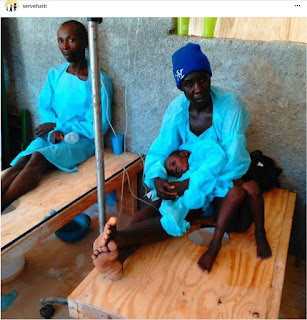When it comes to my travels in Haiti, I'm not the most careful. I've eaten my fair share of "street food". And... tbh... I don't see much different between the street vendors in Haiti and food trucks in the U.S. Well, other than a health code I suppose. I buy fruit and veggies from the market, and then eat them after a quick rinse. I'll utilize the available filtration systems and water delivery relied upon by the locals instead of purchasing purified water. And I tell myself I do this because "if it's 'good enough' for the Haitian locals, then it's good enough for me." My GI tract must not have gotten the memo, or perhaps it did.
It was the spring of 2013 and I had just received my diploma from medical school. I co-piloted a clinic team that hiked up to a church building in rural Haiti to deliver medical care. The trip had plenty of ups and downs. If we're talking about the hike, then I would say we went up and down three mountains (but who's counting) in each trek of the hike. If we're talking about my relationship at the time... then probably more. But we survived (the medical team and my relationship) the mentally and physically exhausting trip.
An amazingly rewarding experience to deliver medical care to this rural community. I won't sit here and defend the merits of delivering healthcare to a community for four days and not return, because there really is no defense. However, the trip was more of an exercise in logistics and feasibility if I'm being honest. The sustainability part was to follow, but plans and priorities change (and vulnerable populations suffer).
But we were back in our cozy, Coralville apartment. The trip was complete. Unpacking had yet to start, but there'd be time for that. We had a big weekend coming up, after all. What had originally been planned as a Haiti fundraiser ended up being downgraded to just family and friends coming up for sand volleyball and a few beers. There may have even been a planned "table-topping" into "You Lost that Loving Feeling" into a proposal, but something happened.
The trips to the bathroom woke me up in the morning. And I couldn't stop. I was having more than four stools an hour and by the time noon hit I had gone to the bathroom nearly a dozen times. If you want to google "rice water stool" you can get a sense for what it looked like... An infectious disease doctor I work with now and have a tremendous amount of respect for remains skeptical of my self-diagnosis of cholera. But, had I seen a patient in Haiti with my history, knowing that it had reached epidemic proportions with the rainy season, I would have arrived at the same clinical diagnosis.

I tried to keep up with my oral intake. I was chugging Gatorade and water and Pedialyte and truthfully anything I could to keep up with my ongoing losses. I tried Immodium to slow down the process, which worked a little. I thought, "Hey, maybe I can go join in on the fun with my GF and her friends playing volleyball." I even changed to head that way. But then I started walking down the steps... and I wasn't as ready as I had thought. Sooooo, it happened and I had to bail on our plans for the day. And it was a sore subject. Another fracture in the foundation of love that led to the demise of a promising relationship. But how do you tell someone you had an accident like that? You don't. You keep it locked up deep inside of you until you finally have to write a blog post about ongoing issues with cholera in Haiti.

Unfortunately a new outbreak has surfaced starting this past weekend. The clinic I've served at (aptly named ServeHaiti) has been forced to put its cholera treatment tent back into use. It also has converted a newly built "waiting pavilion" into a cholera treatment center to house the patients surviving the hike to the clinic. We've already had two deaths at the clinic, and reports of several more that could not make it.
Worth noting that the clinic is a car ride followed by a 4-5 hour donkey ride from the source of the outbreak, so how many patients are stuck in rural-er Haiti unable to receive medical treatment?

By day two of my illness I was dehydrated. I was having fevers and chills. I had cramps so bad I couldn't eat and I'd vomit anything I tried to drink. I gave up trying to do it the "Haitian" way. I took full advantage of my white American privilege and my mentor at the time brought two bags of IV fluid to my apartment. My body was like a vacuum. The bags were empty in less than 30 minutes. No pressure needed. I took antibiotics, Zofran and a steady dose of AC to keep cool from the Iowa heat. I didn't even have to face the embarrassment of going to the world class institution that is the University of Iowa Hospitals and Clinics to receive treatment. I didn't have to admit to having an illness that literally made me crap when I walked.
The people of Ma Georges face the harsh reality that help is not nearby. No girlfriends and mentors with IV catheters and sterile tubing. No Walgreen's with shelves upon shelves of prepackaged rehydration therapies. No toilets to flush away the evil and send it to a processing center. They're at the mercy of the elements for their water supply and sanitation. And it's probably the privilege in me that causes me to say that I'm not sure who feels more powerless.
I encourage anyone interested to follow @ServeHaiti on social media platforms for updates on the #Cholera #Outbreak. That's where these photos are from.














